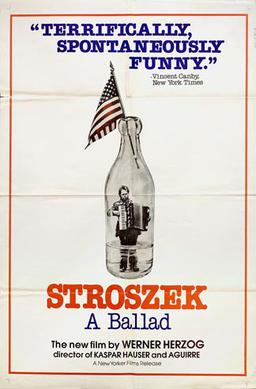
This week's top pick comes from Werner Herzog, one of the great auteurs of the New German Cinema. "Stroszek" was released in 1977 and stars Bruno S. in a Transatlantic narrative set in Berlin and Middle America. As it follows our protagonist on his existential journey, the film is a fascinating example of the type of impactful filmmaking that Herzog and his German contemporaries were fostering at the time.
"Stroszek" begins in Berlin, where Bruno Stroszek (Bruno S.) has just been released from prison after serving an undisclosed sentence relating to his alcoholism. Sent back into the real world with a warning to quit drinking, his first destination is a bar, in a bit of ironic humour that's typical of the film. While there, he meets a young prostitute in trouble named Eva (Eva Mattes). Feeling sorry for her, he invites her to move in with him. But trouble follows Eva to her new sanctuary, where she and Bruno face incessant harrassment and humiliation from her former pimps. With no apparent solution, the pair decide to leave Germany for greener pastures. Soon, they're on their way to America, upon the suggestion of their older neighbour Scheitz (Clemens Scheitz), who accompanies them on their trip. Safely arrived in their new home, the trio must now learn how to survive in the strange environment of rural America.
With a filmography that included "Aguirre, the Wrath of God" and "The Enigma of Kaspar Hauser", Herzog had already begun to establish his trademark interest in telling stories about how men relate to their society/environment . In "Stroszek", we find him at his most cynical, presenting a protagonist in a constant state of misfortune. Even as the film sees Bruno reclaim his freedom at the start, the trajectory of the narrative leaves him perhaps even more lost by the end of it.
The disullionment that plagues "Stroszek" makes for an interesting comparison to Wim Wenders' "Paris, Texas". Both films find their protagonists in a somewhat nomadic state, fleeing from troubled pasts that have been exacerbated by their relationships with women. In both cases, the men are similarly sympathetic, despite their own faults. But while Wenders is concerned with Travis' various reconciliations, Herzog's Bruno is a man without any emotional ties to places or people. As such, he's able to balance the bleak undercurrent with a devil-may-care comic approach.
Indeed, our three main characters seem to adjust fairly well in a place where they clearly don't belong. Herzog's choice of location is it's own cruel joke, placing our band of outsiders in the kind of unpleasant backcountry where ignorance seems inbred. This bizarre setting is all the more interesting for how these foreigners respond, especially when it comes to the performance of the inimitable Bruno S.
Herzog surely knew that Bruno would be ideal for the role (it's no coincidence that all the actors use their real names in the film), the actor having suffered depressing hardship in his own life. I honestly can't recall another actor like him, with his genial disposition yet perpetually vacant face. He's even more well-cast in "The Enigma of Kaspar Hauser", but this performance brings out more of his natural comic gifts.
There's a strangeness throughout "Stroszek" that's quite unlike most of the films we usually see today. In the climax however, Herzog's vision fully comes together in brilliantly absurdist fashion. It involves a runaway Bruno and dancing chickens, and it's all such a curious sight that it reinforces my new belief that the directors of New German Cinema (specifically Rainer Werner Fassbinder, Werner Herzog and Wim Wenders) were the best when it came to film endings. This film and so many others of this particular movement of cinema are truly one of a kind.
This film is part of my German Cinema marathon.









